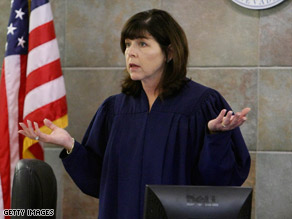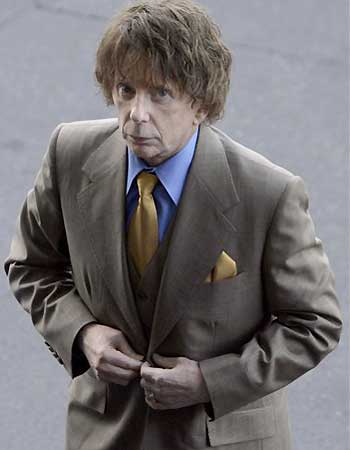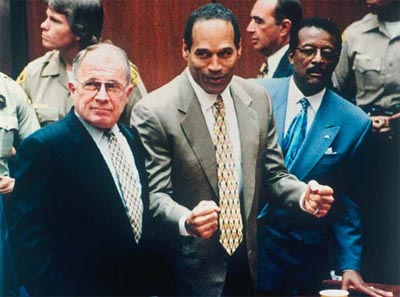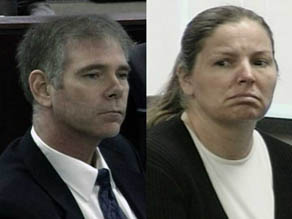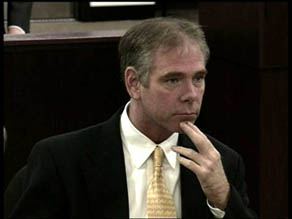"How does the Defendant plead: Guilty or Not Guilty?" bellows a gruff judge. "Autrefois Acquit, Your Honor," replies the Defendant. "Autre...fois...what?" stammers a surprised and exasperated judge. "Autrefois Acquit, Your Honor," the Defendant answers once again with a coy smile.
Someone (like his lawyers) should have told Phil Spector when this rare plea by a defendant actually works, and when it's just a lot of hot air and a big waste of the Court's time.
Listen, Phil, such a plea only works when a judge commutes a charge to one less severe. It doesn't work as an acquittal when a defendant doesn't want lesser charges to be included. The Supreme Court has already ruled on this, my friend. You and your lawyers are behind the times (and I think they're just trying to waste more of your hard-earned money).
Now, if the judge were to have ruled that you did not murder Lana Clarkson, but had accidentally shot her, thus being an involuntary manslaughter charge, then your double jeopardy plea would work in this case. It does not work, no way, no how the way you want to make it work and you are only disgracing this wonderful and sacred American right with your vapid argument.
That's my dithyramb for the day about music magnate, Phil Spector and his otiose Motion for Stay on Double Jeopardy Grounds. With the above now stated, my question to all of you is simple:
What is the plea of autrefois acquit and why do we have it?
Let's begin, shall we?
Autrefois acquit is a peremptory plea or a plea made before a trial begins that may estop the government from carrying on with a trial against the defendant on the grounds of double jeopardy. Its etymology is derived from Anglo-French meaning "formerly acquitted." In the United States, a person cannot be tried twice for the same offense because to do so is proscribed in the Bill of Rights, which was ratified into law by the First United States Congress on December 15, 1791.
The Fifth Amendment to the United States Constitution states:
"No person shall be held to answer for a capital, or otherwise infamous crime, unless on a presentment or indictment of a grand jury, except in cases arising in the land or naval forces, or in the militia, when in actual service in time of war or public danger; nor shall any person be subject for the same offence to be twice put in jeopardy of life or limb; nor shall be compelled in any criminal case to be a witness against himself, nor be deprived of life, liberty, or property, without due process of law; nor shall private property be taken for public use, without just compensation."
This means that once jeopardy detaches (when a defendant is found NOT GUILTY or a charge is Dismissed with Prejudice), the case is over and can never be reopened against the defendant no matter what new and compelling inculpatory evidence might later be found.
The legal maxim of double jeopardy is one of the oldest in Western civilization. In 355 B.C., Athenian statesman Demosthenes averred, "The law forbids the same man to be tried twice on the same issue." The Romans later codified this principle in the Digest of Justinian in A.D. 533. The principle also survived the Dark Ages (A.D. 400-1066), notwithstanding the deterioration of other Greco-Roman legal traditions, through CANON LAW and the teachings of early Christian writers.
A real world example of this is O.J. Simpson who was found NOT GUILTY of the murders of his wife and her friend, Ronald Goldman. In 2007, O.J. Simpson published a book, "If I Did It," which exposited in very macabre detail basically how he had killed his wife and Ronald Goldman. Since O.J. Simpson was acquitted, he can never be retried for the offenses so he, in essence, gets away with double murder. One could also look at it from the perspective that it became O.J. Simpson's legal right to commit the murders once he was acquitted because of the constitutional protection against double jeopardy.
In a nutshell, it's a legal technicality meant to protect a person against an overzealous government and it has been a precept embedded in Anglo-Saxon common law predating the eleventh century. It has also been found in Greek and Roman laws, notably the dicasteries, since circa 1,000 B.C., meaning it's been a fundamental human right well before Pontius Pilate crucified Christ.
Its fundamental purpose is to protect a person from the power and wealth of the government. Without a concept of double jeopardy, a defendant would be in interminable jeopardy:
Imagine that you were tried and acquitted of murder. Whether you had done it or not, you would still remain the government's prime suspect. The police would never move on or concentrate on a different person of interest. The government and, more so, the police would relentlessly harass you because of it. They would continually search your house and property because they would still have probable cause to get a warrant signed by a judge.
To harass you into confessing, the police would barge in late at night with a warrant to disturb your family's sleep. Your wife would leave you because she couldn't take it anymore and she would take your kids. You would never get enough sleep from all of this and they would harass you at work so you would, in turn, lose your job. You would not have enough money after all of the appeals by the government to contest the charge anymore thus making it easier for the government to get a GUILTY verdict or convincing you to willingly confess to something you did not do.
If you think about it, why wouldn't you confess? You've lost your wife, your family, your job, your house, and your entire way of life. The alternative of confessing to something you didn't do is far better than living the rest of your life in a state of interminable jeopardy.
Furthermore, without a concept of double jeopardy, a Prosecutor does not have to make a strong case against a defendant because, if he should fail, he can always do it again. This would lead to more innocent people's going to jail because they are being targeted with weak evidence. It could also lead to more guilty people's getting away with their crimes because investigators would concentrate on one suspect and never be dissuaded from that one.
The question must be posed that, "if your wife were murdered, everyone and his uncle know that YOU would be the prime suspect." They are never going to leave you alone because of this and, without protection against double jeopardy, you may be subjected to a pathetic prosecutorial case that leads to a conviction on some of the weakest evidence. You may also be acquitted, but who cares? They can wait and do it again should more evidence arise in the future. Are you getting scared now?
In England, the government has scrapped double jeopardy as of A.D. 2005. That means, although you may have been acquitted for a murder or rape you did not commit, you still have reason to worry because they're looking at you again and this time, you can forget the presumption of innocence because, if a case should be brought back to court, it means a judge thought there to be good reason and you have virtually no chance at beating it this time---innocent or not.
That's the problem with not having a concept of double jeopardy---a case is never closed; no finality exists. When a man is convicted of a crime and serves his time, he cannot be tried again and put into prison for the exact same offense. He is free from persecution, therefore it makes sense that a man who is acquitted should feel the same freedom from persecution and that is why we have a clause in our Constitution that protects us Americans from the power, wealth, and unlimited resources of the government.
Now there are some people who get upset when they hear murderers walk free and then tell their stories about how they got away with it, but, in my mind, that's just tough. The bigger concern for us as a society is those innocent people who are rotting away in prison or who have been put to death for crimes they did not commit. As former United States Supreme Court Justice Hugo L. Black once said:
" The underlying idea…is that the State with all its resources and power should not be allowed to make repeated attempts to convict an individual for an alleged offense, thereby subjecting him to embarrassment, expense, and ordeal and compelling him to live in a continuing state of anxiety and insecurity; as well as enhancing the possibility that, even though innocent, he may be found guilty.”
Amen to that, Justice Black.
Anyway, There are also two other peremptory pleas and they are autrefois convict and plea of pardon (Cough! Choke! Scooter Libby) . An example of a protection against double jeopardy for the guilty would be to suppose you were charged with first-degree murder, but a jury found you only GUILTY of manslaughter stating that there wasn't enough evidence to show that you meant to kill the victim.
Instead of getting life in prison or the death penalty, you receive 10-15 years and are out in 8 years. Two years after your release, new evidence is discovered that would sufficiently prove that you committed premeditated murder. There is nothing that can be done about this because you have already been convicted for this offense. You shouldn't have to be subjected to more punishment at a later date. It keeps the government from trying to get its way when it doesn't like the outcome of a case.
In England, the Crown was well-known for its abuse of defendants' rights especially when the Royal Family had a special interest in a particular case. In many cases in Britain during the seventeenth and eighteenth centuries, double jeopardy only existed in capital crimes or crimes punishable by death so the King would influence many verdicts. There were many trials in which the jury found a defendant NOT GUILTY, but the Crown ordered the court to issue a judgement non obstante veredicto, which is a judgment notwithstanding the verdict. Even though the defendant was found NOT GUILTY, the court would change the verdict to GUILTY and sentence the defendant accordingly.
Later, when the laws were changed to try to halt the Crown from abusing its power, the King issued exorbitant jailers' fees to prevent an acquitted defendant from being released by his captors. The fees were meant to force defendants to pay their captors for their encarceration, but they were so usurious that many acquitted defendants were known to have died in prison for failure to come up with enough funds to meet their release.
In the United States, a judgment non obstante veredicto can only be issued upon the defendant's request to change a jury verdict from GUILTY to NOT GUILTY. A judge cannot throw out a NOT GUILTY verdict because of the defendant's Fifth Amendmet right to be protected against double jeopardy and his Sixth Amendment right to a "trial by jury."
Although, should a judge change a verdict to NOT GUILTY, the prosecution can file an immediate appeal because the original verdict was GUILTY. It's one of the few times the government can appeal a NOT GUILTY verdict in the United States, but it has to be an immediate appeal, which usually means the prosecution has somewhere within the vicinity of 24 hours to file the appeal or the verdict is upheld. This time allotment may differ from state to state.
If you have ever seen the movie "Fracture," and you know the plea of autrefois acquit, then you know that the producers screwed up in this movie. In the movie, Anthony Hopkins' character was found NOT GUILTY of the attempted murder of his wife. Later she was taken off life support and died from the injuries sustained from the gunshot wound to the head inflicted by her husband.
At the end of the movie, the Prosecutor has Anthony Hopkins' character rearrested for murder as he claims he now has the bullet from Hopkins' wife's head and the gun they couldn't find until Anthony's character told him where to look, which is all new evidence. He claims that double jeopardy doesn't apply in this case because Hopkins was charged with attempted murder, but since his wife has since died, it can now be upgraded to a murder charge, which is not the same offense. Anthony Hopkins' character is then put back on trial.
This is wrong because double jeopardy protects against BASICALLY the same offense, too. The double jeopardy defense, in this case, would be collateral estoppel. Since Anthony Hopkins' character was acquitted of the attempted murder of his wife and his wife died of complications from injuries sustained from that encounter, he cannot be retried under the charge of his wife's murder. The government would be arguing, in essence, the same thing---thus double jeopardy.
In real life, Anthony's lawyers would have had their client plead AUTREFOIS ACQUIT along with NOT GUILTY at his arraignment and this charge of murder, even though he did it, would never have seen the inside of a courtroom. In fact, it would have probably led to a lawsuit filed by the Defendant against the government for "malicious prosecution."
So remember, a person cannot be tried twice for the same offense or something that is basically the same offense in the United States. Double jeopardy is up there with bills of attainder, lettres de cachet, writs of habeus corpus, and ex post facto laws: They are inalienable rights of all Americans---of all mankind.
